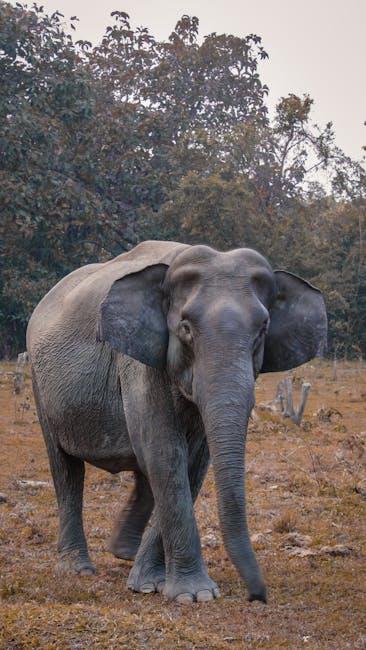Across Africa, from Namibia to Uganda, elephant babies are trying to keep their heads above water, trying to suckle, to keep up with the herd, to make it to adulthood. But one third of baby elephants will die in this first year of life. And sometimes the threat to a baby's survival comes from within the herd. It's been a good year. The elephant herds of Uganda are increasing. In the 1980s, they were poached to the brink of extinction in the country.
Now there are more than 5000 individuals. The land is green. There's plenty to eat. Newborns are almost lost in the grass. It takes a whole herd to raise a baby elephant. Female elephants help look after each other's calves. It's called alloparenting. In the process, young females learn how to care for their siblings and calves are given a better chance of survival. The babies are born after almost two years of gestation. This long development time gives them another survival advantage. They can stand and walk immediately after birth so they can reach their mother's milk. They will rely on it for the first year. Each day, the baby elephant gains almost 1kg, or two pounds of body weight. Scientists have discovered that the composition of elephant milk differs from that of all other mammals, as well as being different for Asian and African elephants. It actually changes as the baby grows. The protein, mineral and fat content increases during lactation, providing more energy as the baby develops. But despite the best care a herd can offer, about one third of baby elephants will die in this first year of life.
They will never reach adulthood. There are many threats. Water, the thing elephants need the most can also kill them. Adults need to drink up to 189 liters, or 50 gallons a day. Despite the raging torrent, the family has to cross, but babies can't swim until they're several months old. Adults have evolved ways to push their young along. They used their trunks like arms to usher them to safety. In Namibia, water isn't always plentiful, but elephants can smell it from up to around 19 kilometers or 12 miles away. This herd is making a beeline for a man-made watering spot in Etosha National Park. A new study has found that in warm weather, elephants can lose up to 10% of all the water in their bodies. That equates to about two full bathtubs a day, the highest level of daily water loss ever recorded in a land mammal. It's a relief to drink, but still, the herd must stay alert. Baby elephants are intelligent little beings, but they aren't born with the instinct to use their most important appendage - their trunk. They can't use it to grasp food or to suck up water.
This can make drinking awkward and precarious. A youngster falls into the trough. He calls to alert the adults. The herd reacts in unison. The water isn't deep, but the panicked baby could easily drown. The trough is narrow and hard to access. The females can only watch on while the youngster remains stuck. Many trunks, but no rescue, until a mature female finally lifts him to safety. Even at natural waterholes, like this one in Namibia, where there's plenty of room to move, female elephants must stay calm when dealing with emergencies so as not to panic others in the herd, especially their calves. Mud baths should be enjoyable, not traumatic. This matriarch gives a youngster a helping trunk, a lesson for baby and another young member of the herd. But Elephant Society isn't always so cooperative. Researchers at Mushara Waterhole in Namibia have witnessed a darker side of the elephants' nature where danger doesn't lie outside the herd, but within it.

This baby and his mother are chased away from the water by the matriarch. The calf just wants some fun, but he sent back to his mother by the other females. Despite living with the herd for the last 5 years, the mother is left to care for her baby alone. Most of the herd begins to move on, turning their backs on the mother and her calf. Two females even throw irritating dust at the parent. The baby has become weak. The stress of rejection may have left the mother unable to produce enough milk.
The calf needs to drink around 2 litres of milk every 2 hours. He's getting weaker by the second and is now unable to stand up to feed. If he doesn't drink soon, he will die of dehydration. Why is this baby destined to die while others are saved? Researchers think this cruel behavior is evidence of a pecking order within the herd. Each elephant has their place in the hierarchy and that status is passed down through generations. This isn't in keeping with our perception of elephant behavior, Herds can break up in places where poaching occurs, but not usually in places like this, where the herd is protected and there's enough food and water.
Here in the Namibian desert, resources are scarce. No baby gets left behind. Each one of them is precious. Elephant herds are complex societies. We can only observe and try to understand the dynamics at work within them. In understanding their behaviour at much deeper levels, we may also be able to help them survive. Thanks for watching. We have more interesting videos about elephants, so check out our playlist and please consider subscribing. We have a new upload every Friday..
https://howtoplaythedjembedrums.com/why-so-many-african-elephants-dont-survive-their-first-year-3/

No comments:
Post a Comment